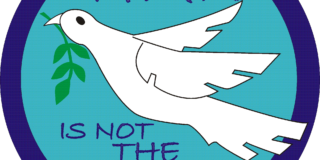
Abstract
The assertion that “Man is the only real enemy we have” offers a thought-provoking view of the human condition, implying that the root causes of societal struggles – such as hunger and overwork – stem primarily from human actions and constructs rather than external forces. This paper delves into both sides of the argument, examining humanity’s role in perpetuating conflict and suffering, along with the possibility that internal psychological obstacles, especially fear, may be the principal adversary in human experience. By investigating historical and contemporary examples, this work provides a nuanced analysis of the intricate interplay between internal and external factors shaping our challenges, offering a deeper understanding of the complexities of the human experience.
Introduction
The idea that humanity itself represents the greatest barrier to a better world is a compelling one. It suggests that the most significant impediments to achieving peace, progress, and well-being are not external forces but are instead rooted in human behaviour and consciousness. This perspective aligns with the philosophical notion that “the prison is the mind“, proposing that our greatest struggles originate from within. On the other hand, opposing arguments point to systemic issues – poverty, inequality, and environmental destruction – as external threats that demand confrontation. This paper explores both perspectives, analyzing humanity’s duality as both a source of conflict and a catalyst for change.
Humanity as Its Own Worst Enemy
A Historical Lens
History is rife with examples of human actions as the root cause of immense suffering and conflict. From the devastation of wars and the brutality of colonisation to the systemic exploitation of entire populations, humanity has often been its own nemesis. The atrocities of the 20th century, including the Holocaust, the Rwandan Genocide, and the Vietnam War, were all products of human greed, fear, and hatred. These devastating events underscore how humanity’s choices have exacerbated hunger, hardship, and despair, often turning people against one another.
The Holocaust serves as a stark reminder of the depths of human cruelty, where the actions of a regime led to the systematic extermination of millions. Similarly, the Rwandan Genocide, fuelled by ethnic tensions and historical grievances, resulted in the loss of an estimated 800,000 lives in just a few months. These events highlight how human decisions, driven by hatred and fear, can lead to catastrophic outcomes.
The Burden of Societal Constructs
Societal frameworks, such as capitalism, often prioritise profit over people, perpetuating inequality and exploitation. Although capitalism drives innovation and economic growth, it also sustains cycles of poverty and labor abuse. Many workers endure poor conditions and excessive workloads, fostering burnout and dissatisfaction. For instance, the gig economy, while offering flexibility, often subjects workers to precarious employment without benefits, leaving them vulnerable to financial instability.
Similarly, hunger often results from human-induced decisions, whether through resource mismanagement, conflict, or neglect of vulnerable communities. The 2007-2008 food crisis, driven by speculative trading and biofuel policies, demonstrated how human actions could lead to widespread food insecurity. Such examples reflect humanity’s failure to prioritise equity and compassion, fuelling the collective suffering of many.
Fear: The Invisible Opponent
Fear functions as a dominant force within the human psyche, influencing actions that undermine collective well-being. Fear of scarcity drives hoarding, while fear of “the other” incites violence and discrimination. These psychological barriers give rise to societal structures that maintain inequality and conflict. For example, the fear of immigrants often leads to xenophobic policies that further marginalise vulnerable populations, preventing the establishment of a more inclusive society.
As a deeply ingrained mechanism, fear plays a pivotal role in shaping destructive behaviours and systems, making it a formidable enemy that humanity must confront. The COVID-19 pandemic exemplified how fear can lead to panic buying, further exacerbating supply chain issues and leading to increased scarcity for many.
The Case for External Forces as True Enemies
Systemic Challenges
Acknowledging humanity’s role in societal problems does not diminish the significance of external systemic factors. Economic systems, environmental destruction, and political corruption often operate beyond the control of any individual. For instance, climate change, driven by industrialisation and mass consumerism, poses a profound threat to global food stability. The Intergovernmental Panel on Climate Change (IPCC) has warned that climate change could displace millions and exacerbate food insecurity, demonstrating how external forces can profoundly impact human well-being.
Moreover, systemic inequalities in wealth distribution lead to social unrest and conflict. The Occupy Wall Street movement, which emerged in response to economic disparities, highlighted the frustrations of many who felt marginalised by a system that favoured the wealthy. Such external challenges illustrate that while human actions contribute to societal issues, they are often compounded by larger, systemic forces that must be addressed.
The Complexity of Human Nature
The argument that humanity is inherently the sole enemy oversimplifies the diverse motivations and behaviours of individuals. While some people act from fear or self-interest, others strive for altruism, equity, and justice. Countless examples exist of individuals and communities devoted to combatting hunger, promoting social justice, and building resilience. Organisations like World Food Programme and various grassroots movements illustrate how humans can come together to address the very issues they sometimes perpetuate.
This duality in human nature contradicts the notion that humanity as a whole is its own worst enemy, instead emphasising the potential for people to be agents of positive change. The civil rights movement in the United States, for instance, showcased the power of collective action in overcoming systemic oppression, demonstrating that humanity can rise above its darker tendencies.
Embracing Unity to Overcome Fear and Challenges
Identifying fear as a major obstacle to progress does not exclude the need to address external challenges. Instead, it highlights the power of collective action and solidarity in dismantling systems that perpetuate suffering and inequality. By facing fear – both personally and as a society – communities can unite to create more equitable systems, paving the way for effective solutions to hunger and exploitation.
The global response to the COVID-19 pandemic showcased humanity’s capacity for unity in the face of fear. Communities came together to support one another, highlighting the importance of collaboration and empathy in overcoming challenges. This collaborative effort underscores humanity’s capability to not only be the source of problems but also the architect of solutions.
Conclusion
The claim that “Man is the only real enemy we have” opens the door to a profound examination of the human condition. While it is undeniable that humanity’s actions have caused significant suffering and conflict, it is equally crucial to consider the role of systemic forces and the complexity of human nature. Fear emerges as a powerful internal barrier, but it also has the potential to spur individuals toward confronting challenges. Ultimately, humanity’s duality – as both the problem and the solution – holds the key to building a more equitable and compassionate world. By addressing both internal fears and external threats, we can work toward a future where suffering caused by hunger and overwork is eradicated – not by removing humanity from the equation, but by elevating our shared consciousness and fostering collective progress.



